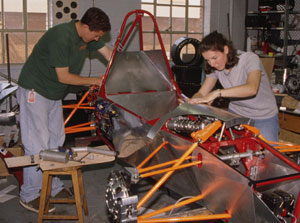Undergraduate Non Degree Courses
| The following courses are applicable to study in several departments and do not carry departmental designations. The undergraduate courses listed below were developed specifically for students outside of engineering with the objective of broadening the base of a general liberal arts education with some background in the technology area. These "New Liberal Arts" courses are designed to teach some of the basic technology of their respective fields to the non-engineering student and the courses are structured to take advantage of the background and interests of the student in a liberal arts area of study. Most students will use these courses to satisfy free electives in their programs. Engineering students also may find these courses of value in broadening their perspectives regarding their fields of study and may wish to use them as free electives in their programs.
|
 |
Undergraduate Course Descriptions (ENGR)
1014: ENGINEERING RESEARCH SEMINAR
Discussion of current research topics in the College of Engineering by Virginia Tech Faculty. Credit earned for this course may be used to satisfy degree requirements. (1H,1C)
1034: FIRST YEAR HYPATIA SEMINAR
Success strategies designed for first-year women engineering students in the Hypatia residential community: information on study skills, gender issues in engineering industry, leadership, technology skills, engineering departments/ majors. Credit not applicable to meeting degree requirement (3H,3C)
1054: FIRST YEAR GALILEO SEMINAR
Success strategies designed for first-year male engineering students who are participants of the Galileo residential community: information on study skills, gender issues in the engineering industry, leadership, technology skills, engineering departments/majors. Credit not applicable to meeting degree requirements. (3H,3C)
1814: ENERGY, RESOURCE DEVELOPMENT AND THE ENVIRONMENT
Population trends. Renewable and non-renewable energy. Coal mining methods, reclamation of mined lands. Petroleum and natural gas. Nuclear waste. Land management, aquifer depletion. Development of mineral reserves, surface and underground mining, environmental impacts. Minerals in world economics. Geopolitical concerns. Global environmental effects of industrial enterprises. Sustainable development. Effects of social structures. Regulatory processes and national/international legislation. (3H,3C) I,II.
2044: SECOND YEAR HYPATIA SEMINAR
Success strategies designed for second year women engineering students who are participants of Hypatia, the women in engineering residential community; topics include women in the engineering workplace, leadership, and goals associated with academic and professional success. Credit not applicable to meeting degree requirements. (1H,1C)
2984: SPECIAL STUDY
Variable credit course.
3004: MENTORING SEMINAR
Course will prepare engineering students to mentor first year engineering students: focus on leadership and team building skills, study skills development, technology skills engineering departments/majors, college policies and procedures. Credit not applicable to meeting degree requirements. Pass/Fail only. (1H,1C)
3064 (MSE 3364): EVOLUTION OF MINING TECHNOLOGY
The origin of modern mining technology traced from conception to modern times. The diverse engineering factors necessary to find, develop, mine, and process a mineral deposit in the modern world are demonstrated against a background of international mineral demand. Junior standing required. (3H,3C) I.
3124: INTRODUCTION TO GREEN ENGINEERING
Introduction to green engineering and global environmental issues. Impacts of human and engineering activities on the environment, and techniques that can be utilized to minimize adverse environmental impacts with emphasis on ISO 14000, and environmentally conscious design and manufacturing. Pre: (CHEM 1035 or CHEM 1074), ENGE 1016, PHYS 2306. (3H,3C)
3134: ENVIRONMENTAL LIFE CYCLE ASSESSMENT
Practical application of life cycle assessment (LCA) to engineering products, processes, and systems. Industrial and government application of LCA. LCA case studies. LCA methodologies including inventory, impact assessment, improvement analysis, and streamlining. LCA applications including life-cycle design, ecolabeling, costing, and public policy in the United States and abroad. Pre: (CHEM 1035 or CHEM 1074), ENGE 1016, PHYS 2306. (3H,3C)
3984: SPECIAL STUDY
Variable credit course.
4974: INDEPENDENT STUDY
Variable credit course.
4984: SPECIAL STUDY
Variable credit course.
TOP
|
